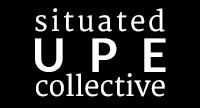Most of my students have no idea what the difference between capitalism and socialism is. Let me say that differently: most of my students have emotional responses to those words. Some have strong instincts about which is good and which is ugly. But in terms of an ability to define and give distinguishing examples, maybe a few here and there walk in with this ability. (And given the conflation of terms in U.S. American public discourse, it seems hard to blame them).
Some have taken introduction economics courses. If I were in charge of general education requirements, I’d make sure that student learn not (only) about mathematical principles, but about the logics of different economics systems. Until that point (!), I accept it means I have to do this work before I can teach about environment and society.
One year, when still teaching from a textbook, I put capitalism up front. We spent a week dedicated to Marxian environmental critiques. I quickly found that does not work for my politically diverse classroom.
Instead, I now break the ideas down, avoiding the most evocative terms until the building blocks are in place. We slowly talk about markets, explaining what markets do well and what they struggle with (and, what human and environmental costs there are even in fully ‘functional’ free markets). We talk about property and the differences between private, state, commons (this is nearly impossible for many to imagine, regularly conflated with state ownership) and lack of ownership. We talk about government, its logic, and different iterations of democracy and electoral democracy (it is the will of the people, or what elected officials deem best for the people?)
Each week, we work really hard to understand the logic of different ‘stories’, building ‘archetypes’ of free markets, fully enforced property rights (and wrestling with whether this means internalizing costs for all externalities), regulated commons and so on. Then we talk about the disjuncture between these and the real world. We ask whether the archetypes work, whether they might work in practice, trying to find our way towards which imperfect ideas are worth fighting for. We disagree on the answers to this, and I think that’s useful.
My hope for my students is that by the end, they see that their world is not actually made up of truly democratic, capitalist free markets owned by private actors. They’re at a public institution, many living in state-owned housing. They share their apartments as if they were commons (with many unspoken rules and internal conflict resolution). I want those who believe in big and small government to consider ‘how big ought government be’ and ‘what are its capabilities’ rather than narrate ‘always smaller’ or ‘always bigger’.
Mostly, I want them to be able to make sense of those they disagree with. To understand where the other side is coming from. To see that most ideas have some logic to them, but that no archetypical idea is flawless in practice. To be able to have civil disagreements in which they can point to real underlying differences (rather than simply name indescribable ideologies). Maybe it’s too much to ask of our national public discourse, but at a very small scale, for a few months, on a few (big, important) issues, we work towards that.
